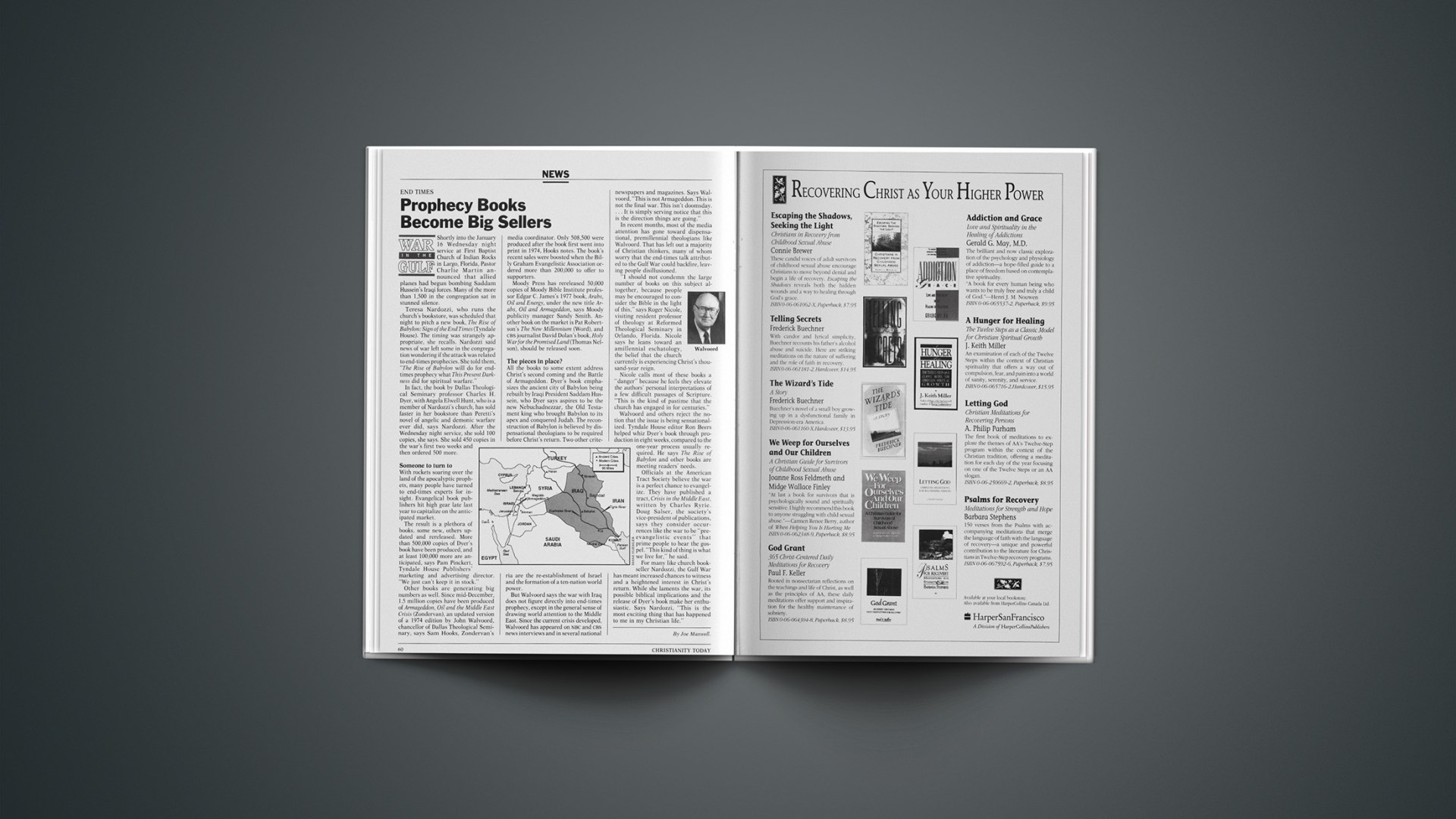Shortly into the January 16 Wednesday night service at First Baptist Church of Indian Rocks in Largo, Florida, Pastor Charlie Martin announced that allied planes had begun bombing Saddam Hussein’s Iraqi forces. Many of the more than 1,500 in the congregation sat in stunned silence.
Teresa Nardozzi, who runs the church’s bookstore, was scheduled that night to pitch a new book, The Rise of Babylon: Sign of the End Times (Tyndale House). The timing was strangely appropriate, she recalls. Nardozzi said news of war left some in the congregation wondering if the attack was related to end-times prophecies. She told them, “The Rise of Babylon will do for end-times prophecy what This Present Darkness did for spiritual warfare.”
In fact, the book by Dallas Theological Seminary professor Charles H. Dyer, with Angela Elwell Hunt, who is a member of Nardozzi’s church, has sold faster in her bookstore than Peretti’s novel of angelic and demonic warfare ever did, says Nardozzi. After the Wednesday night service, she sold 100 copies, she says. She sold 450 copies in the war’s first two weeks and then ordered 500 more.
Someone To Turn To
With rockets soaring over the land of the apocalyptic prophets, many people have turned to end-times experts for insight. Evangelical book publishers hit high gear late last year to capitalize on the anticipated market.
The result is a plethora of books, some new, others updated and rereleased. More than 500,000 copies of Dyer’s book have been produced, and at least 100,000 more are anticipated, says Pam Pinckert, Tyndale House Publishers’ marketing and advertising director. “We just can’t keep it in stock.”
Other books are generating big numbers as well. Since mid-December, 1.5 million copies have been produced of Armageddon, Oil and the Middle East Crisis (Zondervan), an updated version of a 1974 edition by John Walvoord, chancellor of Dallas Theological Seminary, says Sam Hooks, Zondervan’s media coordinator. Only 508,500 were produced after the book first went into print in 1974, Hooks notes. The book’s recent sales were boosted when the Billy Graham Evangelistic Association ordered more than 200,000 to offer to supporters.
Moody Press has rereleased 50,000 copies of Moody Bible Institute professor Edgar C. James’s 1977 book, Arabs, Oil and Energy, under the new title Arabs, Oil and Armageddon, says Moody publicity manager Sandy Smith. Another book on the market is Pat Robertson’s The New Millennium (Word), and CBS journalist David Dolan’s book, Holy War for the Promised Land (Thomas Nelson), should be released soon.
The Pieces In Place?
All the books to some extent address Christ’s second coming and the Battle of Armageddon. Dyer’s book emphasizes the ancient city of Babylon being rebuilt by Iraqi President Saddam Hussein, who Dyer says aspires to be the new Nebuchadnezzar, the Old Testament king who brought Babylon to its apex and conquered Judah. The reconstruction of Babylon is believed by dispensational theologians to be required before Christ’s return. Two other criteria are the re-establishment of Israel and the formation of a ten-nation world power.
But Walvoord says the war with Iraq does not figure directly into end-times prophecy, except in the general sense of drawing world attention to the Middle East. Since the current crisis developed, Walvoord has appeared on NBC and CBS news interviews and in several national newspapers and magazines. Says Walvoord, “This is not Armageddon. This is not the final war. This isn’t doomsday.… It is simply serving notice that this is the direction things are going.”
In recent months, most of the media attention has gone toward dispensational, premillennial theologians like Walvoord. That has left out a majority of Christian thinkers, many of whom worry that the end-times talk attributed to the Gulf War could backfire, leaving people disillusioned.
“I should not condemn the large number of books on this subject altogether, because people may be encouraged to consider the Bible in the light of this,” says Roger Nicole, visiting resident professor of theology at Reformed Theological Seminary in Orlando, Florida. Nicole says he leans toward an amillennial eschatology, the belief that the church currently is experiencing Christ’s thousand-year reign.
Nicole calls most of these books a “danger” because he feels they elevate the authors’ personal interpretations of a few difficult passages of Scripture. “This is the kind of pastime that the church has engaged in for centuries.”
Walvoord and others reject the notion that the issue is being sensationalized. Tyndale House editor Ron Beers helped whiz Dyer’s book through production in eight weeks, compared to the one-year process usually required. He says The Rise of Babylon and other books are meeting readers’ needs.
Officials at the American Tract Society believe the war is a perfect chance to evangelize. They have published a tract, Crisis in the Middle East, written by Charles Ryrie. Doug Salser, the society’s vice-president of publications, says they consider occurrences like the war to be “pre-evangelistic events” that prime people to hear the gospel. “This kind of thing is what we live for,” he said.
For many like church bookseller Nardozzi, the Gulf War has meant increased chances to witness and a heightened interest in Christ’s return. While she laments the war, its possible biblical implications and the release of Dyer’s book make her enthusiastic. Says Nardozzi, “This is the most exciting thing that has happened to me in my Christian life.”










